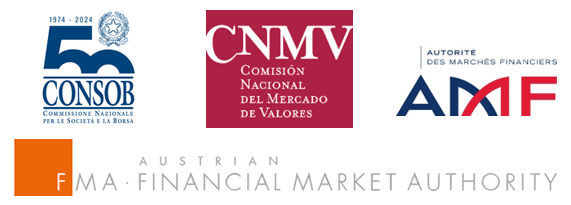Joint Press Release of 15 April 2024 - CONSOB AND ITS ACTIVITIES

PRESS RELEASE
The Commissione Nazionale per le Società e la Borsa (CONSOB - Italy), the Comisión Nacional del Mercado de Valores (CNMV - Spain), the Autorité des marchés financiers (AMF - France) and the Finanzmarktaufsicht (FMA - Austria) today publish their key priorities as part of the debate on the macro prudential approach to asset management and in view of the European Commission's forthcoming consultation on this topic.
In recent years, risks arising from Non-Bank Financial Intermediation (NBFI) have been the focus of global regulators' attention, especially as their relative share in the global financial system has increased. Concerns have also been raised about the potential negative effects on the real economy of shocks spread through or generated by Non-Bank Financial Intermediation.
These debates are important and legitimate.
The specific characteristics of asset managers need to be taken into account when developing the regulations necessary to address their risks. The ecosystem of asset management is different from that of banks and equally diverse, as are the vulnerabilities highlighted so far. Therefore, the nature of the risks that regulators aim to address must be precisely defined: regulators should focus as a priority on the characteristics of asset management that generate excessive price volatility and liquidity stress. Capital requirements and liquidity buffers are not the most appropriate solutions to mitigate these risks in terms of financial stability.
Based on these considerations and with regard to the asset management sector, the authorities of Italy, Spain, France and Austria have identified five priorities. The first three relate to short- and medium-term measures, while the others should be pursued in the long term:
- ensure widespread availability and increased use of Liquidity Management Tools (LMTs) in all types of Open-Ended Funds (OEFs): the recent revision of the Alternative Investment Fund Managers Directive (AIFMD) will significantly advance the adoption of LMTs, although Level 2 measures are still under development;
- banning the amortised cost accounting of Money Market Funds (MMFs): amortised cost accounting is inherently detrimental to financial stability, amounts to misrepresentation to investors, making them believe that they enjoy a stable Net Asset Value (NAV), and incentivises first movers;
- systematic stress tests should also be envisaged to better understand the vulnerabilities of each asset management group and its interconnections with other participants in the financial system;
- introduce a truly consolidated supervisory approach for large cross-border asset management groups: as their teams and funds are currently supervised by different national competition authorities in different countries, the creation of a supervisory college for these groups would bring significant benefits both in times of stress and in normal market conditions;
- create an integrated data hub, shared by market supervisors and central banks, which meets the reciprocal needs, both in terms of day-to-day supervision and stress-testing exercises.
